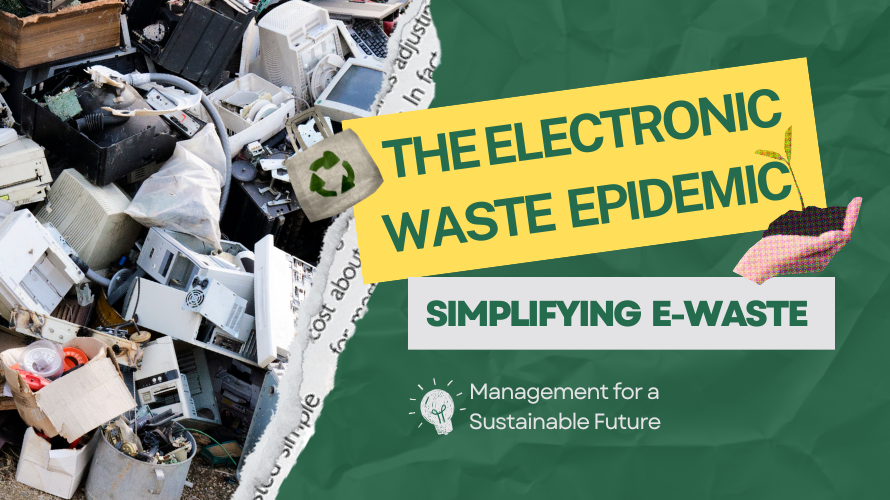Introduction
The world is grappling with an unprecedented surge in electronic waste (e-waste) generation, with devastating consequences for our planet. According to the Global E-Waste Monitor 2024, the world generated a staggering 74.1 million metric tons of e-waste in 2023, with expectations to rise to 85.5 million metric tons by 2025. As the volume of e-waste continues to increase, it becomes imperative to address the need for sustainable and effective e-waste disposal solutions. This is where an e-waste management company in India plays a crucial role in ensuring responsible recycling, reducing environmental harm, and promoting a circular economy.
The Environmental, Health, and Economic Impacts of E-Waste
E-waste poses significant environmental, health, and economic risks. Toxic chemicals such as lead, mercury, and cadmium contaminated soil and water, while the improper disposal of e-waste leads to the loss of valuable resources. Moreover, the informal recycling of e-waste in developing countries exposes workers to hazardous conditions, highlighting the need for sustainable and responsible e-waste management practices.
The Role of Extended Producer Responsibility (EPR) in E-Waste Management
Extended Producer Responsibility (EPR) is a policy approach that assigns producers responsibility for the waste generated by their products. By embracing EPR, manufacturers are incentivized to design more sustainable products, reduce waste, and invest in responsible recycling practices. EPR has been successfully implemented in several countries, demonstrating its potential to transform e-waste management.
Simplifying E-Waste Management: Best Practices and Strategies
- Design for Sustainability: Manufacturers can design products with recyclability, reusability, and minimal waste generation in mind.
- Implement Take-Back Programs: Companies can establish take-back programs, allowing consumers to return used products for responsible recycling.
- Invest in Recycling Infrastructure: Governments and businesses can invest in developing recycling infrastructure, ensuring the safe and efficient processing of e-waste.
- Promote Awareness and Education: Raising awareness about the risks associated with e-waste and promoting education on responsible e-waste management practices are crucial for inspiring behavioural change.
Effective E-Waste Management Solutions for Businesses
- E-Waste Collection and Transportation: Partner with certified e-waste collectors to ensure the safe and responsible transportation of e-waste. 2. Responsible Recycling and Disposal: Collaborate with recycling facilities that adhere to environmentally responsible practices, ensuring the secure destruction of sensitive data.
- Data Destruction and Security: Implement robust data destruction and security measures to protect sensitive information and maintain regulatory compliance.
The Economic Benefits of Sustainable E-Waste Management
- Cost Savings: Implementing sustainable e-waste management practices can lead to significant cost savings, as businesses reduce waste disposal costs and minimize regulatory risks.
- Reduced Regulatory Risks: Sustainable e-waste management can help businesses reduce regulatory risks by ensuring compliance with e-waste regulations and minimizing the risk of non-compliance.
- Resource Conservation: Sustainable e-waste management practices can help conserve valuable resources, reducing the need for primary materials extraction and processing.
- New Revenue Streams: Sustainable e-waste management can create new revenue streams for businesses through the sale of recycled materials, refurbished equipment, and other value-added products.
Conclusion
The e-waste epidemic demands immediate attention and collective action. By embracing sustainable e-waste management practices, businesses can reduce environmental risks, promote resource conservation, and capitalize on economic benefits. As we strive to create a more sustainable future, it’s essential that we simplify
the process of managing electronic waste, ensuring a safer, healthier, and more prosperous world for generations to come.
References:
Global E-Waste Monitor 2024 (https://unitar.org/about/news-stories/press/global-e waste-monitor-2024-electronic-waste-rising-five-times-faster-documented-e-waste recycling)
- International Telecommunication Union (ITU)
- International Solid Waste Association (ISWA)
- United Nations University (UNU)
Join the E-Waste Revolution
As we strive to create a more sustainable future, it’s essential to acknowledge the critical role that Extended Producer Responsibility (EPR) and responsible e-waste management play in mitigating the environmental impacts of electronic waste. By embracing innovative solutions and collective responsibility, we can revolutionize the way we produce, consume, and dispose of electronic devices.
Get in Touch
Ready to embark on a sustainable e-waste management journey? Contact us at info@spkglobalgroup.com or visit our website at www.spkglobalgroup.com to explore our expert solutions and EPR services.
As a leading e-waste recycling company in India, we are committed to providing responsible and effective recycling solutions that protect the environment and promote sustainability.
Your Voice Matters
What are your thoughts on EPR and electronic waste management? “Join the movement! Your input will be the spark that ignites meaningful change and propels us towards a more sustainable future.
"Let's work together to create a more sustainable future for generations to come! Best regards,
– SPK Global Group

